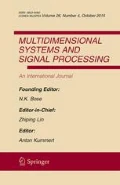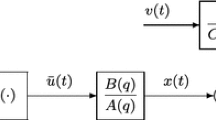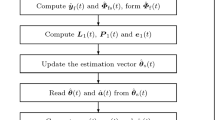Abstract
Parameter estimation has wide applications in one-dimensional and multidimensional signal processing and filtering. This paper focuses on the parameter estimation problem of multivariate output-error autoregressive systems. Based on the data filtering technique and the auxiliary model identification idea, we derive a filtering based auxiliary model generalized stochastic gradient algorithm. The key is to choose an appropriate filter to filter the input-output data and to study a novel method to get the system model parameters and noise model parameters respectively. By employing the multi-innovation identification theory, a filtering based auxiliary model multi-innovation generalized stochastic gradient algorithm is proposed. Compared with the auxiliary model generalized stochastic gradient algorithm, the proposed algorithms can generate more accurate parameter estimates. Finally, an illustrative example is provided to verify the effectiveness of the proposed algorithms.




Similar content being viewed by others
References
Afshari, H. H., Gadsden, S. A., & Habibi, S. (2017). Gaussian filters for parameter and state estimation: A general review of theory and recent trends. Signal Processing, 135, 218–238.
Aslam, M. S. (2016). Maximum likelihood least squares identification method for active noise control systems with autoregressive moving average noise. Automatica, 69, 1–11.
Cao, X., & Zhu, D. Q. (2017). Multi-AUV task assignment and path planning with ocean current based on biological inspired self-organizing map and velocity synthesis algorithm. Intelligent Automation and Soft Computing, 23(1), 31–39.
Cham, C. L., Tan, A. H., & Tan, W. H. (2017). Identification of a multivariable nonlinear and time-varying mist reactor system. Control Engineering Practice, 63, 13–23.
Cheng, J. X., Fang, M. Q., & Wang, Y. Q. (2017). Subspace identification for closed-loop 2-D separable-in-denominator systems. Multidimensional Systems and Signal Processing, 28(4), 1499–1521.
Cheng, Y., & Ugrinovskii, V. (2016). Event-triggered leader-following tracking control for multivariable multi-agent systems. Automatica, 70, 204–210.
Chu, Z. Z., Zhu, D. Q., & Yang, S. X. (2017). Adaptive sliding mode control for depth trajectory tracking of remotely operated vehicle with thruster nonlinearity. Journal of Navigation, 70(1), 149–164.
Dhabal, S., & Venkateswaran, P. (2017). A novel accelerated artificial bee colony algorithm for optimal design of two dimensional FIR filter. Multidimensional Systems and Signal Processing, 28(2), 471–493.
Ding, D. R., Wang, Z. D., Ho, D. W. C., et al. (2017). Distributed recursive filtering for stochastic systems under uniform quantizations and deception attacks through sensor networks. Automatica, 78, 231–240.
Ding, F., Wang, F. F., Xu, L., et al. (2017a). Decomposition based least squares iterative identification algorithm for multivariate pseudo-linear ARMA systems using the data filtering. Journal of the Franklin Institute, 354(3), 1321–1339.
Ding, F., Wang, F. F., Xu, L., et al. (2017b). Parameter estimation for pseudo-linear systems using the auxiliary model and the decomposition technique. IET Control Theory and Applications, 11(3), 390–400.
Ding, F., Wang, X. H., Mao, L., et al. (2017). Joint state and multi-innovation parameter estimation for time-delay linear systems and its convergence based on the Kalman filtering. Digital Signal Processing, 62, 211–223.
Ding, F., Xu, L., & Zhu, Q. M. (2016). Performance analysis of the generalised projection identification for time-varying systems. IET Control Theory and Applications, 10(18), 2506–2514.
Ding, F., Yang, H. Z., & Liu, F. (2008). Performance analysis of stochastic gradient algorithms under weak conditions. Science in China Series F-Information Sciences, 51(9), 1269–1280.
Feng, L., Wu, M. H., Li, Q. X., et al. (2016). Array factor forming for image reconstruction of one-dimensional nonuniform aperture synthesis radiometers. IEEE Geoscience and Remote Sensing Letters, 13(2), 237–241.
Jafari, M., Salimifard, M., & Dehghani, M. (2014). Identification of multivariable nonlinear systems in the presence of colored noises using iterative hierarchical least squares algorithm. ISA Transactions, 53(4), 1243–1252.
Ji, Y., & Ding, F. (2017). Multiperiodicity and exponential attractivity of neural networks with mixed delays. Circuits, Systems and Signal Processing, 36(6), 2558–2573.
Jin, Q. B., Wang, Z., & Liu, X. P. (2015). Auxiliary model-based interval-varying multi-innovation least squares identification for multivariable OE-like systems with scarce measurements. Journal of Process Control, 35, 154–168.
Katayama, T., & Ase, H. (2016). Linear approximation and identification of MIMO Wiener-Hammerstein systems. Automatica, 71, 118–124.
Levanony, D., & Berman, N. (2004). Recursive nonlinear system identification by a stochastic gradient algorithm: Stability, performance, and model nonlinearity considerations. IEEE Transactions on Signal Processing, 52(9), 2540–2550.
Liang, J. L., Wang, Z. D., & Liu, X. H. (2014). Robust state estimation for two-dimensional stochastic time-delay systems with missing measurements and sensor saturation. Multidimensional Systems and Signal Processing, 25(1), 157–177.
Li, J. F., & Zhang, X. F. (2015). Sparse representation-based joint angle and Doppler frequency estimation for MIMO radar. Multidimensional Systems and Signal Processing, 26(1), 179–192.
Li, J. P., Hua, C. C., Tang, Y. J., et al. (2014). A time-varying forgetting factor stochastic gradient combined with Kalman filter algorithm for parameter identification of dynamic systems. Nonlinear Dynamics, 78(3), 1943–1952.
Li, M. H., Liu, X. M., & Ding, F. (2017a). Least-squares-based iterative and gradient-based iterative estimation algorithms for bilinear systems. Nonlinear Dynamics, 89(1), 197–211.
Li, M. H., Liu, X. M., & Ding, F. (2017b). The maximum likelihood least squares based iterative estimation algorithm for bilinear systems with autoregressive moving average noise. Journal of the Franklin Institute, 354(12), 4861–4881.
Li, M. H., Liu, X. M., & Ding, F. (2017c). The gradient based iterative estimation algorithms for bilinear systems with autoregressive noise. Circuits, Systems and Signal Processing, 36(11), 4541–4568.
Li, X. F., Chu, Y. D., Leung, A. Y. T., & Zhang, H. (2017d). Synchronization of uncertain chaotic systems via complete-adaptive-impulsive controls. Chaos Solitons & Fractals, 100, 24–30.
Ma, P., & Ding, F. (2017). New gradient based identification methods for multivariate pseudo-linear systems using the multi-innovation and the data filtering. Journal of the Franklin Institute, 354(3), 1568–1583.
Mercère, G., & Bako, L. (2011). Parameterization and identification of multivariable state-space systems: A canonical approach. Automatica, 47(8), 1547–1555.
Mu, B. Q., & Chen, H. F. (2013). Recursive identification of MIMO Wiener systems. IEEE Transactions on Automatic Control, 58(3), 802–808.
Pan, J., Jiang, X., Wan, X. K., et al. (2017). A filtering based multi-innovation extended stochastic gradient algorithm for multivariable control systems. International Journal of Control, Automation and Systems, 15(3), 1189–1197.
Pan, J., Yang, X. H., Cai, H. F., et al. (2016). Image noise smoothing using a modified Kalman filter. Neurocomputing, 173, 1625–1629.
Saikrishna, P. S., Pasumarthy, R., & Bhatt, N. P. (2017). Identification and multivariable gain-scheduling control for cloud computing systems. IEEE Transactions on Control Systems Technology, 25(3), 792–807.
Tseng, C. C., & Lee, S. L. (2017). Closed-form designs of digital fractional order Butterworth filters using discrete transforms. Signal Processing, 137, 80–97.
Wan, X. K., Li, Y., Xia, C., et al. (2016). A T-wave alternans assessment method based on least squares curve fitting technique. Measurement, 86, 93–100.
Wang, Y. J., & Ding, F. (2016). Novel data filtering based parameter identification for multiple-input multiple-output systems using the auxiliary model. Automatica, 71, 308–313.
Wang, Y.J., Ding, F., & Xu, L. (2018) Some new results of designing an IIR filter with colored noise for signal processing. Digital Signal Processing, 72, 44–58.
Wang, Z., Jin, Q. B., & Liu, X. P. (2016). Recursive least squares identification of hybrid Box-Jenkins model structure in open-loop and closed-loop. Journal of the Franklin Institute, 353(2), 265–278.
Xing, H. L., Li, D. H., Li, J., et al. (2016). Linear extended state observer based sliding mode disturbance decoupling control for nonlinear multivariable systems with uncertainty. International Journal of Control, Automation and Systems, 14(4), 967–976.
Xu, L. (2014). A proportional differential control method for a time-delay system using the Taylor expansion approximation. Applied Mathematics and Computation, 236, 391–399.
Xu, L. (2015). Application of the Newton iteration algorithm to the parameter estimation for dynamical systems. Journal of Computational and Applied Mathematics, 288, 33–43.
Xu, L. (2016). The damping iterative parameter identification method for dynamical systems based on the sine signal measurement. Signal Processing, 120, 660–667.
Xu L. (2017). The parameter estimation algorithms based on the dynamical response measurement data. Advances in Mechanical Engineering, 9. https://dx.doi.org/10.1177/1687814017730003.
Xu, L., Chen, L., & Xiong, W. L. (2015). Parameter estimation and controller design for dynamic systems from the step responses based on the Newton iteration. Nonlinear Dynamics, 79(3), 2155–2163.
Xu, L., & Ding, F. (2017a). Parameter estimation for control systems based on impulse responses. International Journal of Control, Automation and Systems, 15(6). https://dx.doi.org/10.1007/s12555-016-0224-2.
Xu, L., & Ding, F. (2017b). Recursive least squares and multi-innovation stochastic gradient parameter estimation methods for signal modeling. Circuits, Systems and Signal Processing, 36(4), 1735–1753.
Xu, L., & Ding, F. (2017c). Parameter estimation algorithms for dynamical response signals based on the multi-innovation theory and the hierarchical principle. IET Signal Processing, 11(2), 228–237.
Xu, L., Ding, F., Gu, Y., et al. (2017). A multi-innovation state and parameter estimation algorithm for a state space system with d-step state-delay. Signal Processing, 140, 97–103.
Zhang, B., & Mao, Z. Z. (2107). Bias compensation principle based recursive least squares identification method for Hammerstein nonlinear systems. Journal of the Franklin Institute, 354(3), 1340–1355.
Zhao, N., Chen, Y., Liu, R., Wu, M. H., & Xiong, W. (2017a). Monitoring strategy for relay incentive mechanism in cooperative communication networks. Computers & Electrical Engineering, 60, 14–29.
Zhao, N., Wu, M. H., & Chen, J. J. (2017b). Android-based mobile educational platform for speech signal processing. International Journal of Electrical Engineering Education, 54(1), 3–16.
Acknowledgements
This work was supported by the National Natural Science Foundation of China (No. 61273194) and the Fundamental Research Funds for the Central Universities (JUSRP51733B).
Author information
Authors and Affiliations
Corresponding author
Rights and permissions
About this article
Cite this article
Liu, Q., Ding, F. The data filtering based generalized stochastic gradient parameter estimation algorithms for multivariate output-error autoregressive systems using the auxiliary model. Multidim Syst Sign Process 29, 1781–1800 (2018). https://doi.org/10.1007/s11045-017-0529-1
Received:
Revised:
Accepted:
Published:
Issue Date:
DOI: https://doi.org/10.1007/s11045-017-0529-1




